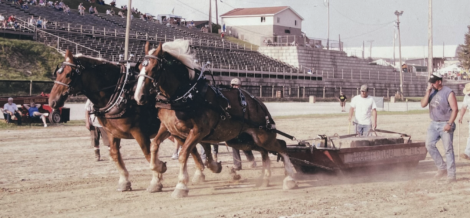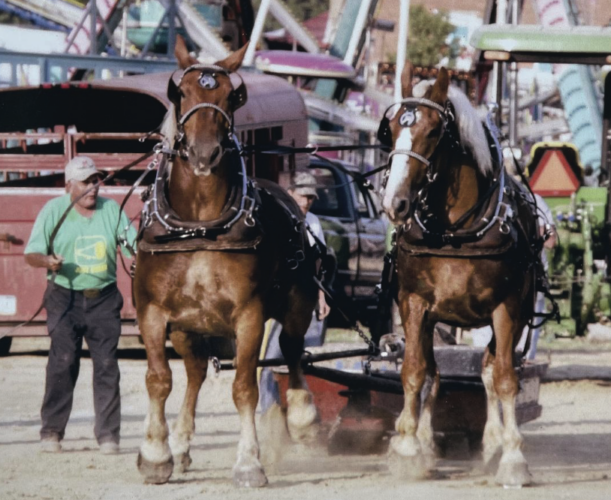From Farm Fields to Fairgrounds: The Enduring Power of Horse-Pulling


These days, the term “horsepower” recalls rugged pick-up trucks with huge towing capacities. But in the 18th and 19th centuries, farming in Washington County relied heavily on pulling power from massive draft horses to pull plows and carts, enabling farmers to cultivate large tracts of land. These massive creatures with their powerful musculature and stocky builds demonstrate the original meaning of the term.
The sport of horse pulling began as a friendly competition among farmers. These horses were the muscle of the farm, and the family’s pride. Farmers would boast about their horses and challenge each other to pulling competitions. In the beginning, they would take a barn door down, hitch it to their horses and see how many people the horse could pull on the barn door. The winner of the contest would get bragging rights for the rest of the year.
In the early 1900’s, there were over 25 million horses and mules working on farms in the United States. The invention of the tractor changed all of that. By the 1920’s only the largest and wealthiest farms were using tractors, and the Great Depression in the U.S. delayed the adoption of the new machinery in agriculture for years. Horses remained the most significant source of power on farms in the beginning of the nineteenth century, but gradually gasoline-powered tractors became a more common sight on Washington County Farms.
At age 91, Milton Rice is a first-generation horse puller and a walking history book of the tradition of horse pulling in Washington County. He keeps a collection of newspaper clippings and photos commemorating the sport. He is the superintendent of horse pulling at the fair alongside Ken Harding.
As a first-generation horse puller, and one of the last to come from a farm that relied on horses rather than tractors, Rice experienced the heyday of horse pulling in the 1950’s and 60’s. He recalls friendly competitive horse pulls with other kids from his high school, as well as other farming families.
“It was a family pride thing. It was a family sport. Everybody was proud of their team and they wanted to compete,” says Rice.
As tractors took over the work of horses, horse pulling became more of a sport. The competition of horse pulling was introduced to the Pennsylvania Farm Show in 1939. At that point, the horses that competed in pulls were not working on the farm, they were being trained specifically for competition. Horse pulling was introduced to the Washington County Agricultural Fair in the early 1930’s. In 1960s, Washington County had eleven teamsters that went to the Pennsylvania Farm Show.
“At that time, we probably had at least 15 people in Washington county that pulled horses,” says Milton. This was at the height of its popularity. The horse pulls drew the biggest crowds at the fair and they were always the biggest grandstand event, closing out the fair.
It’s no wonder that horse pulling has kept fans mesmerized, even those that aren’t in the farming industry. The sheer size and strength of these draft horses is a sight to behold. They are essentially the bodybuilders of the equestrian world. The lightweight class includes horses up to 3,400 pounds and heavyweight is anything over that.
“The horses today are heavier, weights unheard of back in the day. They can weigh up to 5,500 pounds now,” says Rice. The horses used to haul around 5,000 pounds but now can haul 8-10,000 pounds.
The maximum prizes at competitions are a drop in the bucket compared to the cost of owning these giant Belgian horses, plus the trailer for hauling them. It’s safe to say that most of the families competing in horse pulls are doing it for the love of the tradition, and the passion for keeping this nod to traditional farming alive. Family pride and the opportunity to have your name passed down in history by the likes of Milton Rice and other enthusiasts is enough of a prize for many teamsters.
Rice recalls some of the big names in horse pulling throughout the decades in Washington County. John Horr is considered the godfather of horse pulling in Washington County in the 1930’s and 40’s, holding the record weight for Pennsylvania for years. Vance Littman of Claysville was elected to the Hall of Fame for horse pulling at the Pennsylvania Farm Show. Then there’s the Eckles family, whose four boys all took to horse pulling and ended up competing against each other, taking up three or four spots at the farm show each year.
As Rice witnessed the peak of horse pulling, he’s also witnessed the decline in popularity over the years. His is the last family in Washington County still active in horse pulling. What once was the biggest event at the fair is now being replaced by shows like the demolition derbies and the newly popular rodeo. In fact, many fairs in the area have dropped horse pulls entirely.
But Washington County still shows up. “When we have the horse pulling contest up at the Washington County Fairgrounds, the show arena is full, and people are sitting on the banks. That’s how much people like seeing the big horses,” says Milton’s wife, Linda. For now, the Rice family works to keep horse pulling in the Washington County Fair and the fair board has been incredibly supportive in keeping the tradition alive. Rice also credits several people with their dedication and support to keep horse pulling at the fair: Bill Iams, Ken and T.J. Harding, Jay Byer, Gino Bioni, and Bobby Bayer. For the Rice family, it’s not just about horsepower–it’s about history, community, and the hope that others will step up to carry the reins.
For more information about the fair and a list of events, please visit washingtonfair.org.
Sponsored content brought to you by Washington County Agricultural Fair and Visit Washington County PA.
